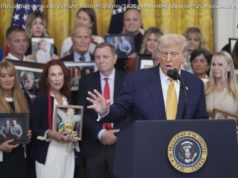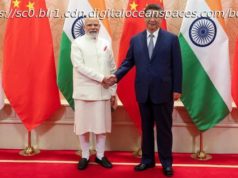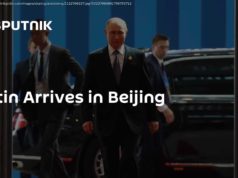A Q&A with Hugh White, a former top Australian official who feels Beijing has already filled the U. S. leadership void.
Contrary to what you might read or hear, President Donald Trump alone hasn’t surrendered U. S. strategic leadership in Asia to China. What he has done is accelerate long-term trends that have severely diminished America’s position in the Western Pacific, an area where the U. S. had held sway largely unchallenged since World War II.
That era of primacy is close to an end. In fact, the U. S. strategic position is eroding so quickly that even sharing the region with China isn’t really a valid option any longer, argues Hugh White, a professor at the Australian National University in Canberra. America’s allies in Southeast Asia and Australia say they don’t want to choose between the U. S. and China, but underneath those platitudes, nobody in the region wants to make an enemy of Beijing. All the more so because officials increasingly doubt the U. S. will be there in the end, according to White.
White put these thoughts to paper and pixel with a much-debated essay in the Australian publication Quarterly Essay. „Without America“ envisions a Situation Room scene where a fictitious U. S. president decides that, even with America’s superior conventional military, the risk of a confrontation with China just isn’t worth it. Even if the U. S. prevailed, all China would need to do would be to inflict a couple of glancing blows and it would, politically, have triumphed.
For context, White is no raging left-wing academic. He has worked for Bob Hawke, a former Australian prime minister, and Kim Beazley, Hawke’s defense minister. Both politicians were among the most pro-American figures in the Australian Labor Party. Beazley subsequently served as Australian ambassador to Washington from 2010 to 2016.
White’s opinions have not gone unchallenged — among others, frequent Bloomberg View contributor Hal Brands took a few shots. To give him a chance to clarify his predictions and present them to a broader global audience, we spent a few days recently interviewing him over email. Here is a lightly edited transcript:
Daniel Moss: Given China’s huge stake in the world economy and the combined role that China and the U. S. play, why would either side get themselves into a situation where there becomes a face-off where one must blink?
Hugh White: Clearly China and America face an economic equivalent of mutually assured destruction. For each side the economic consequences of a rupture are so immense as to be almost unthinkable. But that doesn’t mean that one side or the other would never be tempted to risk a confrontation, if they come to believe that the other side would blink first. That seems to be what Beijing now assumes, which is why it has been so assertive in recent years. Beijing believes that America will blink first to avert a crisis because its interest in Asia is, in the long run, less important than China’s. And I think they are probably right.
Tobin Harshaw: In a Bloomberg View op-ed last month, Hal Brands of the Center for Strategic and International Studies warned that your outlook on U. S. abdication in the Pacific was over-dire and dangerous in that it could become a self-fulfilling prophecy. What’s your response?
HW: I can understand his concern, but I think it is misplaced. The suggestion that the arguments I have presented may hasten America’s withdrawal from Asia overlooks the massive tectonic forces that are driving this process. As China’s power grows, the costs to America of resisting China’s ambitions for regional leadership grow too. But America’s reasons to remain the primary power in Asia have not become more compelling. The trend therefore is clear: We will reach the point at which the costs of resisting China’s ambitions outweigh the benefits. The failure of Obama’s „Pivot to Asia,“ and the instincts of the current administration, suggest that point is very close, if not already upon us. What people like me say, or what countries like Australia do, makes very little difference.
And as these trends unfold, it seems incumbent on an Australian observer to analyze them as dispassionately as possible, because Australia’s future place in Asia depends on how well we understand them and how effectively we respond.
DM: A year on from Xi Jinping’s 2017 Davos speech, how much has China seized the moral and intellectual high ground in the world’s political economy?
HW: I’m not sure that China has really won any of the moral and intellectual high ground, because its claims to it are so transparently self-serving. But clearly, under Trump, America has lost that high ground. That is not the sole or primary cause of America’s dwindling leadership in Asia or elsewhere — as I said before, I think that’s driven by much larger trends — but the damage Trump has done to America’s leadership credibility certainly accelerates the process. Who can take the U. S. seriously as the guarantor of regional or global order under his leadership? And who can be sure that whoever takes his place will be much better?
DM: China is Asia’s largest economy, but global supply chains of U. S.-headquartered multinationals crisscross the region. Won’t this underpin at least some leadership role for America?
HW: Of course America will remain a major economic player globally, and in Asia, for as far ahead as we can see. But that will not guarantee any leading strategic or political role in the region. Its position will be like that of the Europeans, who trade and invest massively in Asia without any real strategic presence there.
Of course, that will mean that America will have to engage economically within the terms set by a regional strategic order led by others — presumably by China. That won’t be ideal for America, but it would be better than the alternative, if the alternative is to confront China in a bitter all-out contest for regional leadership in which China enjoys many asymmetric advantages. A contest like that would most likely be much more damaging to America economically than accepting the rules in Asia as set by China.
TH: Former Australian Prime Minister Paul Keating, who hails from the Labor Party you served, said that Australia’s longtime alliance with the U. S. has taken on a „reverential, sacramental quality.“ What do you think he meant by that, and do you agree?
HW: Australia’s alliance with America dates back to 1951 or before, and for most of that time there have been hot debates about whether, or how far, Australia can or should depend on America for its security. But since the mid-1990s, that debate has largely disappeared among major political parties, public officials and policy analysts. It has become unquestioned, and unquestionable, across the political spectrum that the alliance can and will remain the foundation of Australia’s foreign and defense policies indefinitely. Indeed, the alliance has come to be seen as inherent in Australia’s national identity; we simply cannot imagine ourselves without it. That is what Keating is referring to here, and he is quite right. The irony is that Australians are clinging harder and harder to American protection as America’s future willingness and capacity to provide the protection is becoming less and less certain.
TH: If we feel that the U. S. has thrown in the towel in the Pacific, what does that mean for Australia in security terms? Does it do more to solidify itself militarily with greater anti-access/area denial capabilities, or should it look to cut security deals with China and other Pacific nations?
HW: Australia has never had to make its way in Asia without the support of a global preponderant ally — first Britain, then America.






